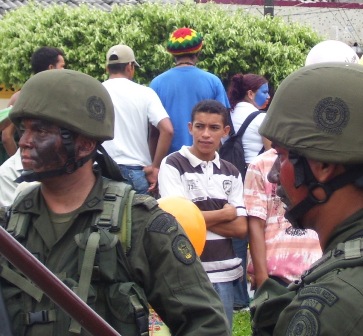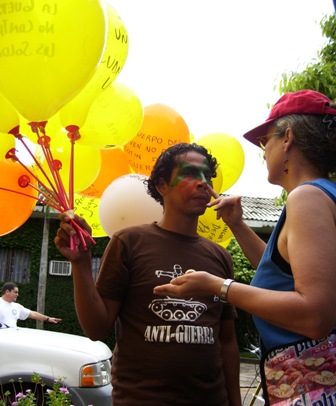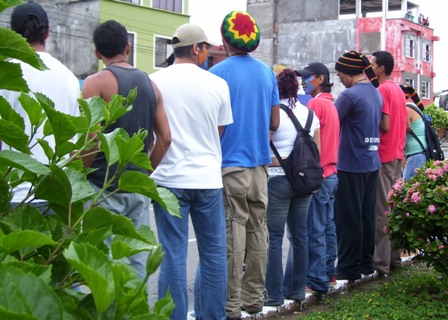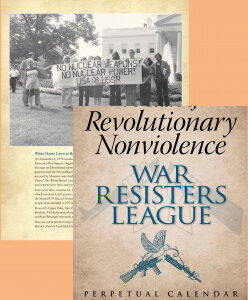Art and Resistance in the Magdalena Medio

Translated by Christian Peacemaker Teams Colombia
The Magdalena Medio is a region in northwest Colombia that contains the city of Barrancabermeja. The Fifth Commandment Youth Collective is an organization of young conscientious objectors, nonviolent activists, and antimilitarists in Barrancabermeja. It struggles for a more inclusive, just, and equal society. Its seeks alternatives to forced recruitment using nonviolent direct action, alternative language as political expression, and workshops to share and exchange knowledge. The following is a statement from the collective.
In 1993, Colombia passed Law 48, which regulates recruitment. Article 14 of this law requires “everyone who turns 18 years of age to clarify their military eligibility.” According to articles 41 and 42, failure to do this can only be sanctioned with a fine. The law does not specify in these cases how recruitment may normally proceed, as described in Articles 14–21.
In addition, forced recruitment violates the right to personal freedom (Article 7), the protection of human dignity (Article 11), and the right to movement (Article 22), all guaranteed in the American Convention on Human Rights.
We further consider this practice a violation of the right to freedom (Article 13), freedom of conscience (Article 18), freedom of opinion (Article 20), and individual liberty (Article 28) in the political constitution of Colombia.
The U.N. working group on arbitrary detention, in its opinion No.8/2008 (Colombia), says to the Colombian government:
“The detention of those who have specifically declared conscientious objection does not have judicial sustenance or legal base. Their conscription into the army against their will is a clear violation of their principles of conscience, contravening article 18 of the International Agreement of Civilian and Political Rights. Not to provide space for conscientious objection can be a violation of this article. Nor do the practices of searches, raids or levies with the intention of stopping in the streets and/or public places the young people who cannot prove their military situation, have legal base or judicial sustenance.”
Colombia is a signatory of the International Agreement of Civil and Political Rights. The right to conscientious objection is recognized by the U.N. Committee on Human Rights as a legitimate exercise of free thought, conscience, and religion.
We argue that our consciences do not allow us to belong to an army or carry a gun, much less murder a human being to fulfill the obligation to be “Heroes of the Mother Country.” We reiterate our lawful exemptions from military service, but the troops in charge of the searches do not listen to our reasons. Rather, they insult us and force us into their trucks, detaining us and depriving us of our freedom.
The military intentionally confuses force with authority and breaks the laws that should govern its behavior—thus becoming a de facto illegal armed group, like those the military forces are said to fight. They will never recognize their illegal behavior, and in their arrogance they believe they can make and modify the laws as they wish. In the perverse myopic logic of peace with a gun, the military classifies us by saying, “If you are not with us, you are against us.” Thus, against our objection, against the vindication of the freedom of thought and conscience, they respond with the cutting blow that we are rebels or guerrillas.
The army commits illegal actions daily, such as arbitrarily searching or detaining young people in streets and public places who cannot prove their military status. We are treated like delinquents, and our rights are violated. Young people are recruited and held for hours in military bases—even after they prove to be exempted by law—taken to the outskirts of town, and in some instances transferred to military bases in other municipalities. When they are released from these facilities, they are given no help to return home, which places their lives at serious risk.
As young people, we acknowledge the conditions of the civil war Colombia is suffering, especially in the region of Magdalena Medio. We do not believe in the use of force and weapons to justify the current order or resolve conflicts. For this reason, we object to participating in any army. Instead, we urgently construct alternatives to the armed conflict lived in Colombia.

To support and accompany efforts for peace and life, we work daily in our alternative languages: the joy of the drum and the dance it supports, the wisdom of theater and the creativity it enhances, the beauty of poetry and the feelings it recreates. Therefore, uniforms, weapons, and violence are dissonant elements in our work with the communities and disrespectful to young people’s efforts to construct a culture of nonviolence.
The army says it wages war to reach peace. We disagree with this slogan because we, the young conscientious objectors, know how the peace that follows wars is a peace of tombs, hatred, resentment, and revenge. It is a fleeting peace constructed by coercive elements. We young people do not want this peace. The peace we work for is a peace arising from the happiness of men and women without hunger; a peace marked by the presence of work, health care, and education; a peace in which conflicts are resolved through negotiation rather than elimination. The peace we want is the peace of life, not the peace of death. For this reason, we young people object to war. For this reason, we young men and women object to raising children for war. Our children will be a seed of life, not fertilizer for cemeteries.


 WRL Perpetual Calendar
WRL Perpetual Calendar